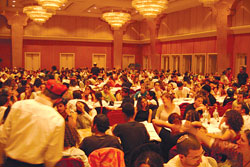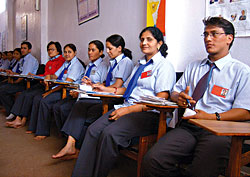|
|
| SHABBATH SHALOM: Israeli holiday makers in last years Pesach. |
The Jewish community has been celebrating Pesach in Nepal for almost two decades, and it coincides with the Nepali new year. The first proper Passover meal was held in the Pumpernickel Bakery in Thamel in 1989 after Israeli and Jewish travellers asked the Israeli Embassy here to help them organise a celebration. The number of people attending the festival since then has grown steadily, in part because Nepal's peak trekking season is the time that backpackers in other parts of South Asia start drifting northward to escape scorching temperatures.
Last year, 2000 attended Pesach here and this year the Beth Chabad, the community's religious centre in Thamel, hopes to draw at least as many to the event at the Hotel Radisson. Two truckloads of kosher food arrived from Israel two weeks ago. "This is probably the largest gathering of Israelis to celebrate Pesach anywhere outside Israel," says Rabbi Mendel of the Beth Chabad. For many young Israelis who may not strictly follow their religion at home, taking part in the festival here becomes a way to reconnect with their community and culture.
Among industry wallahs, Israeli tourists don't have a great reputation: they spend less than other tourists, particularly because they are younger than visitors from other countries and are known to be bargain hunters. Most of them arrive here straight out of compulsory army service in Israel seeking the freedom they have been denied for three long years (for men-women do one year of voluntary service).
But while they spend less per day than other tourists, Israelis stay longer. For many, the trip to Nepal is just one leg in an Asian voyage that easily stretches to six or seven months. First-timer Dana Efraih, 23, travelled overland from India after spending a few months there. "I had the option of staying longer in India but I decided to come here and I found the people much friendlier and hospitable," she says. According to Israeli Ambassador to Nepal Dan Stav, "The major treasure of Nepal is her people. You will never meet such friendly people anywhere else. Even with the conflict, tourists have never been targeted here and I see no reason not to come to Nepal."
NTB's monthly statistics ignore tourists who arrive overland, including many Israelis. For example, of the 9,342 tourists who entered through the Sunauli border in March, 339 were Israelis, according to Naresh Pokhrel, sub-assistant at the NTB desk in Sunauli, but they don't appear anywhere in the tourist tallies.
Michal Dror first visited Nepal last June and now works as a language instructor at the Himalayan Multiple Skills Training Centre, which trains Nepalis who want to work as caregivers in Israel. "For many young Israelis a trip to Nepal is their dream," she explains, "they come here looking for something they can't find back home."
Tova, 53, first came to Nepal three years ago with her son who had already visited four times and couldn't stop raving about Nepal. Now she spends three months a year in Kathmandu as the general supervisor at the Israeli run OR2K restaurant in Thamel. "I feel very much at home here," says Tova, but she has a quibble about foreigners being charged higher prices here: "it should be the same price for all."
While the large number of Israeli visitors to Asia is explained in part by their inability to get tourist visas for Muslim countries, their ability to adapt and survive is an advantage. Because conflict is not new to them, and because Nepal was the first country in this part of the world to establish diplomatic relations with Israel, in 1960, you would think that officials here would be doing more to reach out to Israeli visitors.
Nepali nurses to Israel
|
|
Trainees pay Rs 430,000 for the program that includes air transport to and from Israel and visa processing. "The basic salary a caregiver in Israel earns is $550 a month plus $70-120 as pocket money and with the fact that they live with the employer's family and labour rights are very protected there it's a very safe bet for them," says HIMSTI's Bhaskar Devkota. The institute has published a caregivers' manual in Hebrew, English and Nepali called Shalom with Namaste.
In the past 15 months, 432 Nepalis, most of them women, have been trained and are working as nurses in Israel. At present the 14th batch, 33 women and two men, are undergoing training (pic). They include Yasodha Siwakoti, 31, from Jhapa. "It will be easier for us to work if we learn something first and the institute is wonderful," she says.




